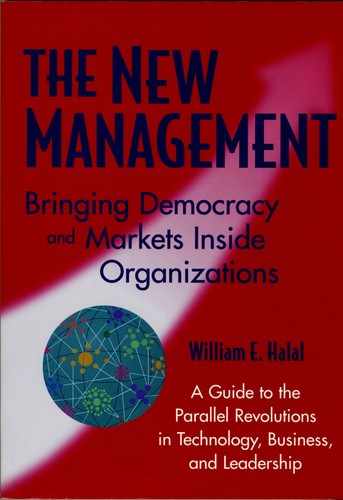FOREWORD
IT IS INCREASINGLY CLEAR that current approaches to managing are not going to work in the 21st century. The growing pressures of global competition, the speed of technological change, and the demands of sophisticated customers for high-quality, efficiently produced customized goods and services are motivating a search for what William Halal calls “the New Management.”
Professor Halal’s book explores this modern dilemma and prescribes two premises to guide managers toward the design of organizations capable of responding to an increasingly complex and challenging business and social environment. Halal’s first premise is that the hierarchical “command” economy that guided traditional organizations from the top down will give way to a disaggregated, “internal market” economy in which myriad autonomous profit centers produce a self-organizing form of control that operates from the bottom up. His second building block is that these internal markets will operate within a broader management system that is guided by the informed involvement of numerous stakeholders—a governance system that he defines as “corporate community,” a simple form of economic democracy.
The premise that 21st century organizations will demand broad economic empowerment of their members is well supported, and Halal’s prescription of internal markets as the mechanism for this empowerment is well argued and illustrated by useful company examples. Decentralizing the decision process to meet diverse and accelerating demands has logical appeal, and Information Age profit centers would appear to have what they need to make good decisions: information, competence, and hard criteria.
The second central premise is far more complex and thus more challenging to both Halal and his readers. The need for broadening the concept of democracy to provide recognition and voice for all major corporate stakeholders is clearly presented. The “how” of this process is not as clear. Halal, like most of us, runs up against the fact that our society, as the late Aaron Wildavsky lamented, does not have a strong philosophical foundation to explain collaborative behavior. That is, while we have libertarian philosophies rationalizing the positive effects of individual initiatives and collectivist philosophies positing the social gains of shared efforts and rewards, we do not have a clear-cut logical system laying out the costs and benefits of behavior motivated simultaneously by personal desires and an awareness of external obligations.
Thus, Halal is forced to make his own arguments, to provide his own definitions and supply his own rationale and conclusions. In general, the case is clearly enough made for my needs, but then I have made similar forays in my own writings. Certainly not all will agree and readers may demand more precision, more evidence, more debate. Indeed, if the book generates that debate, it will have largely succeeded. The governance mechanisms necessary for 21st-century organizations will always be more complex than those of most current forms and will turn on hard realities with soft definitions—trust, human capital, empowerment, etc. In the creation of these mechanisms, debate and inventions will be our most useful companions.
Part Two of the book provides both Halal and his readers another challenge. In this section, he seeks to build conceptual linkages across the legal and social contracts connecting the firm to its customers, its employees, and its ecological community. Underlying this entire section is an argument that includes but goes beyond enlightened self-interest. The sweep of this argument is so broad it defies easy treatment but I believe, as does Halal, that these issues are related and must be managed from an integrated perspective. In an Information Age organization, full responsiveness to customers can only be provided by largely self-managing organization members and the social costs of the enterprise must be addressed by both its members and its clients.
In Part Three, Halal argues that informed, empowered organizational members, operating in systems that allow agile, efficient responses to market forces, are the essential elements of an effective, decentralized global economy. The notion that leadership is best exercised by empowering others, whether at the organizational, national, or international level has always been challenging, even though it is a founding assumption of our society. This section does not put the argument to rest, as no treatment is likely to, but it does remind us that levels of economic institutions and activities are rapidly compressing and that every economic decision is increasingly a global action.
I have know Professor Halal since his days as a doctoral student in the Haas School of Business at the University of California at Berkeley. As his earlier writings have shown, he has never been afraid to accept the challenge of tough and complex issues. In all, this provocative book provides a strong statement of the demands faced by today’s and tomorrow’s managers and offers them a conceptual path through the new economic and organizational jungle. New paths are seldom smooth nor completely clear. I commend Professor Halal for both his contributions and his courage. I believe the reader will do the same.
RAYMOND E. MILES
RAYMOND E. MILES is the Trefethen Professor of Organizational Behavior at the Haas School of Business, University of California at Berkeley. Professor Miles was also dean of the school from 1983 to 1990. His most recent book is Fit, Failure, and the Hall of Fame (New York: Free Press, 1994).
